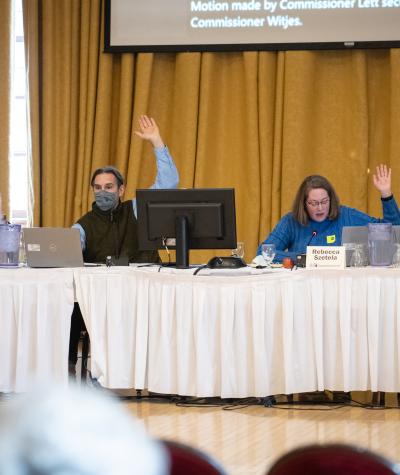In a victory for Michigan voters’ ability to choose their representatives, a federal district court declined to invalidate the congressional maps created by the Michigan Citizens Independent Redistricting Commission.
The court’s ruling, issued on April 1, 2022, said that the plan enacted by the Michigan Independent Citizens Redistricting Commission (the commission), “came the closest to perfect compliance with the Supreme Court’s ‘one-person, one-vote’ rule” and continued a trend of court rulings to protect the right of Michiganders to live under fair maps drawn by the state’s commission.
Independent redistricting commissions (IRC) strengthen democracy by taking the power of redistricting out of the hands of partisan legislators, who have proven willing to use the process to gain or consolidate their power at the expense of drawing maps that fairly represent the communities they serve.
Instead, IRCs give power to citizens to choose their own representatives and create a more fair and transparent process for redrawing districts.
In 2018, Michigan voters passed a citizen-led ballot initiative that created an IRC to draw congressional maps. This initiative earned 61% of the vote and won in 66 out of 83 counties statewide, showing that voters from across the political spectrum wanted to unite against the rigging of elections through gerrymandering and live under fair maps.
Despite the overwhelming support for Michigan’s new IRC, in July 2019, two lawsuits were filed alleging that the IRC’s requirements violated the U.S. Constitution.
Campaign Legal Center (CLC) represented Voters Not Politicians (VPN), the grassroots group that had been responsible for passing the initiative creating the IRC, to defend the IRC’s structure and nonpartisan framework in that case: Daunt v. Benson.
Federal courts rejected those challenges and allowed the commission to proceed with the map drawing process. The commission dutifully adopted and enacted a new plan for Michigan’s 13 congressional districts in late December 2021, after receiving updated population data from the 2020 Census.
However, in January, a group of plaintiffs sued the commissioners and Michigan Secretary of State Jocelyn Benson, challenging the congressional maps, arguing that they violated the “one person, one vote” requirement and claiming that the IRC failed to comply with the guidelines prescribed by the Michigan Constitution.
They also sought to prevent the maps from being used in future elections and wanted to require new maps be drawn.
In February, CLC intervened in the lawsuit on behalf of VNP to ensure that the court faithfully interpreted the redistricting standards enacted by the voters of Michigan.
As the principal sponsor of that ballot initiative, VNP sought to defend the procedures used by the nonpartisan commission and ensure that efforts to undermine its authority or undo the purpose of the amendment were curbed.
Elections should be determined by voters, not politicians. The court’s decision is a win for Michigan’s voters, who overwhelmingly supported the creation of an IRC to design fair maps that ensure our political system is truly of, by and for the people.

